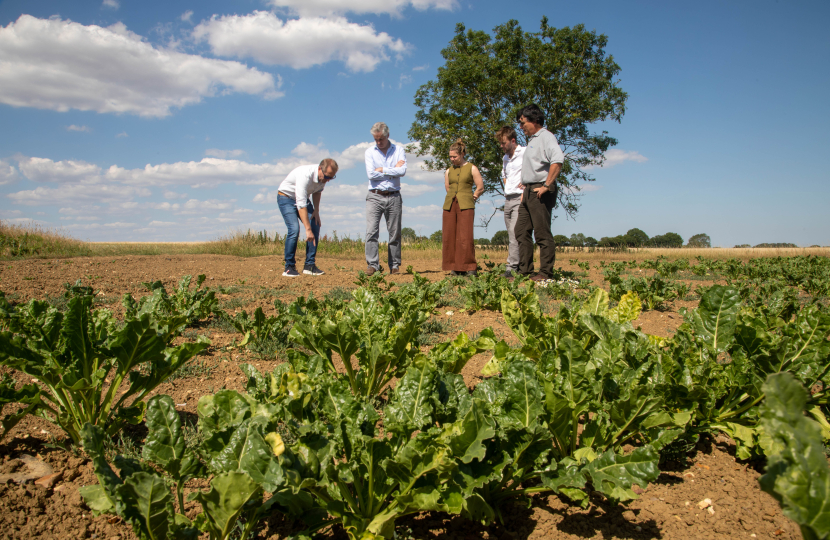
Whilst it’s been wonderful to have such sunny weather of late, visiting farms around the constituency it’s clear that persistently lower than average rainfall is adding to the many challenges they already face – especially with farms in nearby Cambridgeshire facing water rationing. Certainly, we are likely to see an unusually early start to the harvest and this serves as a reminder that our rural communities face tough times ahead.
Since the Autumn Budget in October 2024, there has been considerable debate about proposed reform to inheritance tax on farming assets. I have met with many local farmers and held multiple roundtable discussions with the NFU and the Rural Payments Agency to better understand the potential impact of these changes. The feedback has been unanimous: every single farmer I have spoken to will be detrimentally affected by the Family Farm Tax. This stands in stark contrast to the government’s claim that 73% of farms will be unaffected by the £1 million cap on assets.
Some may argue that £1 million in tax-free assets is generous and that farmers should not expect dispensation. However, to put this into perspective, I recently visited a farm in the constituency where one vital and specialist piece of equipment cost over £500,000 second hand. This is before considering other essential equipment such as tractors, ploughs, drills, and combine harvesters - all vital for producing food and safeguarding our nation’s food security.
The fundamental problem with this policy is that the government is taxing assets, not profits. Farmers need this equipment to produce crops and generate income. Under the new rules, many may be forced to sell their farms just to pay inheritance tax bills. The government’s proposals risk draining the life out of British farming. Unlike other professions, small family farms are passed down from one generation to the next; farming is not just a job, but a way of life. It is hard work, often taking a toll on both mental and physical health, but farmers have persevered, motivated by the knowledge that their efforts will benefit future generations. Now, that certainty is under threat.
In a recent Written Parliamentary Question, I asked the Chancellor if she would meet with local farmers to discuss these proposed changes. The response from James Murray, Exchequer Secretary to the Treasury, was that the government believes it has got the 'balance right' with the Family Farm Tax. In reality however, this policy will damage British farming and deter investment from rural businesses.
At the Suffolk Show in May, I spoke with many rural business owners, including a groundcare machinery dealer who told me that farmers are now reluctant to update their equipment due to uncertainty about the tax’s impact. Essentially, farmers are saving their cash for future tax bills – suggesting that the tax is already chilling investment in rural enterprises. We need a complete rethink of these anti-rural measures, and, quite frankly, the government must start listening and seriously engaging with the farming sector.
Another area where the government must listen is welfare reform. Spending on health and disability-related benefits is projected to reach almost £100 billion by 2030 - more than we spend on defence. This is unsustainable and must be addressed. Of course, I fully recognise that not everyone can work due to disability, but with 923,000 young people not currently in education, employment, or training, it is crucial that opportunities are made available to all.
To help locally, I host an annual Employment and Careers Fair, connecting local businesses with people seeking jobs and training. This year’s fair, held at the Arts Centre - formerly St Peter’s Church - in Sudbury, attracted hundreds of attendees, and I am pleased to report several success stories.
It is also worth noting that welfare reform could help fund increased defence spending. Given the threats posed by Russia and ongoing instability in the Middle East and elsewhere, it is encouraging that NATO members agreed at last month’s summit to raise their spending. However, when we look at the government’s announcement on UK defence funding, we must be honest: claims of allocating 5% to national security and 3.5% to defence are misleading. This is smoke and mirrors at a time when we urgently need real investment to strengthen our deterrence capabilities. The reality is that the government has yet to find a credible way to fund its plans – and that challenge got even harder after the U-turn on welfare reform.
I will continue to stand up for my constituents, on both local and national issues, and to ensure that the voices of our rural communities are heard.
Published in the Suffolk Free Press.

